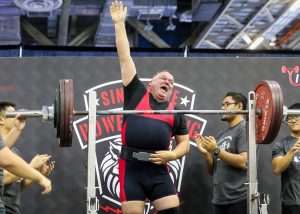We’re pretty sure you hear it all the time. “You go to the gym, right? Why are you still so fat/putting on weight/ *insert physical appearance here* ?”
For many people, exercise is only about looking good. Look at any fitness magazine. It’s usually full of people who are visibly muscular and lean. The men have shredded abs, the women have perky butts, and everyone has desirable arms and zero belly fat.
Well, most people don’t look like this. Fitness models diet and train to get this look, but sustaining it is quite impossible beyond the photoshoot. Even after dieting and training hard, these models themselves don’t look as good in real life as they do on the cover of the magazine – copious use of Photoshop on these images ensure that everything looks “perfect”.
But the media has convinced us that the only reason for training is to look good (which most people think usually involves losing weight). They sell the idea that exercise is all about improving appearances, and many people buy into this narrative.
Health is more than just losing weight
Training for appearances only is both short-sighted. Not everyone wants to, needs to or has to – everyone has different needs and goals.
At Hygieia Strength & Conditioning, the majority of our clients are above 40 who want to improve their overall health, or athletes who train for performance. For them, looking good is just a bonus.
And, underlying all our training plans is a focus on strength, because it forms the basis for every physical attribute. Training for strength has a multiplier effect on just about every fitness goal. So it’s far more useful to first get strong, and then apply that strength gained to your individual goals.
Debunking the “skinny=healthy=fit” weight loss myth
First, a disclaimer. If you’re carrying excess body fat to the point whereby it’s a health risk, then losing this excess body fat is a very pressing issue and should be item number 1 on your list. If you’re working towards losing a couple of kilos of body fat because you think you’ll look better and that boosts your self-confidence, go right ahead. Lastly, if training to look a certain way is your thing and what you enjoy, by all means, go ahead. We’re not denying that. What we’re making an argument against is the narrow mindset that focuses entirely on thinness and weight loss as a hallmark for actual health.
Let’s discuss some common ideas about weight loss and going to the gym.
-
“Skinny fat”, or why a low body weight doesn’t mean fit
Being thin is the epitome of health, right? Wrong. Some people look thin, but they can be “skinny fat”, where they have a relatively low bodyweight, but too little muscle and too much body fat. They may fit into their clothes, but they are not fit by any measure — they’re weak and get breathless climbing stairs. If they’re older, they fall down easily (poor stability and balance). These people don’t need to lose weight, they need to get stronger.
-
Training to gain weight is a positive thing for underweight people
Everyone wants to lose weight, right? Actually, there are skinny guys out there that want to gain weight. We’ve had guys who are about 1.8m tall who weigh only 55kg, and look like they’ll be blown away by a strong gust of wind. For them, training for weight gain has two benefits: their increased muscle mass makes them healthier and stronger, and it also boosts their self-confidence.
-
Going to the gym but not losing weight? Check your diet
Have you ever wondered why you’re not losing weight despite going to the gym? Exercise plays only a small part of the equation to weight loss. There’s no such thing as a weight loss training program, only a weight loss eating program. If you want to drop weight of lose bodyfat, you have to make sustainable, long term changes to your eating habits – there’s no way around it. You can’t out-train a rubbish diet. But because changing your eating habits (and sustaining the change) is hard, and buying a solution seems easier – people who sell “weight loss exercise programs” know that and will tell you what you want to hear to sell their product. But it never works.
Your workout : the many reasons for training
At our gym, no one really cares about training for appearances. In general, our clients skew older. They know what they want, and their reasons for training are bigger and integrated into their broader life goals. Their reasons usually include:
Imagine that you’re a 70-year old grandfather. Is it more important to have shredded abs and bulging biceps? Or to be strong enough to keep up with your grandkids, to be able to play with them without constantly taking rest breaks and suffering from aches and pains thereafter?
Barbell strength training builds muscle/strength and increases bone density – 2 things that are integral to an older person’s quality of life. An overall improvement in fitness will increase energy levels, as well as have positive effects on chronic diseases and ageing.
By improving your health, you are investing in your future. For our elderly clients, this means preserving their physical independence and having the mobility to play with their grandkids, travel the world, and generally function like someone half their age. It also prevents falls and their dangerous consequences. With so many benefits from training for health, a beach body is a rather distant priority.
Among our clients are triathletes, cyclists, runners or golfers who are serious about their chosen sport. They aren’t particularly concerned about having a fitness model’s physique. What they do want is to improve their performance.
Because force production is a common denominator in all sports, increasing your strength through consistent training and practice will increase your ability to produce force, resulting in better overall performance regardless of the sport. In addition, training can have therapeutic benefits, such as reducing back pain and other aches that are common to many athletes.
-
Working out for mental de-stress
In our busy work lives, going to the gym can be a welcome mental break. Many of our clients spend most of their day at a desk, engaged in intellectual work.
For them, training at the gym breaks up their routine. It allows them to carve out me-time from their busy schedules, and to focus intensely on the physical, instead of living only in their heads. Some find that by training hard and pushing against heavy weights, it helps vent their work frustrations.
In general, our clients report that they usually feel more relaxed, and better able to deal with work and life stress after a satisfying training session.
While keeping up an exercise program is not easy, it shouldn’t be something to dread. In fact, we believe that going to the gym should be fun. If it’s not something you enjoy doing, it’s unlikely that you’ll put effort into doing it nor will it be sustainable
There is the joy of the challenge — overcoming your limits, with a confidence boost each time you achieve something you previously couldn’t do. Then there is the joy of learning—like mastering a skill, with a quantifiable sense of progress when you increase the amount of weight that you’re able to lift. In this sense, training can transform far more than the physical.
And when our clients reach a fitness goal or achieve a personal best, it’s something to celebrate. When we see the joy and excitement on their faces, we too are inspired to work harder to create a gym and community that trains for the love of it.
Effective goals are sustainable and aligned to your life values
In our experience, training only for weight loss or improving appearances is very short-sighted. It stems from a false mindset that looking lean is the epitome of health. But this limited goal is unsustainable in the long term, because it’s not aligned to a larger life purpose like health, improvement or enjoyment.
We have seen people who lose weight but can’t keep it off. Losing weight is one thing, but maintaining it is another challenge altogether because the underlying motivation is different. Someone with the goal of weight loss will stay motivated throughout the process. But once they reach their goal, the motivation dies off, and they get fat again. This is why weight loss for its own sake is an unsustainable goal.
We have also seen those who end up thin but unhealthy. Some even get psychologically unhealthy, with body image issues from comparing themselves to perfect media images. What is the point of being lean, if it is harmful to your body and mind? Is it worth it or sustainable?
So while the process of weight loss has its benefits if you’re carrying too much body fat, being lean and training solely to look good shouldn’t be your single end-goal. A much better long-term goal is excellent health.
This is why we focus on strength, because strength is the underlying denominator for a host of different things. Improve your strength, and you will improve your health and your overall quality of life.
If you want to train for looks, there are many solutions out there, some more effective than others. But if you want to train for strength, overall health, or improved performance, we can help you.
So stop thinking that exercise must be for losing weight, or that weight loss is equivalent to health. There are many reasons for training, but the big picture reason is always about strength. If you’re ready to get strong, we here and ready to work with you.






